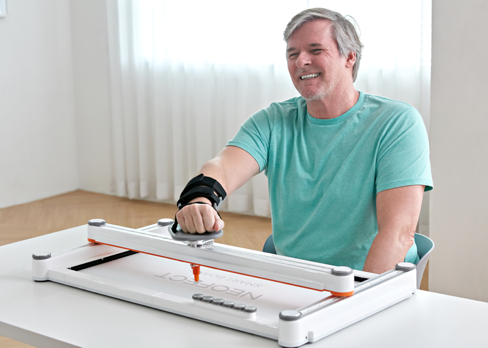Neofect, a Korean company specializing in digital rehabilitation, said on Tuesday that it signed an R&D agreement with the Korea Medical Device Development Foundation (KMDF) to apply artificial intelligence (AI) technologies to develop digital smart boards for patient rehabilitation.

Neofect produces gamified rehabilitation training solutions to help stroke survivors and people with spinal cord injuries, musculoskeletal disorders, or neurological conditions regain independence in dialy activities by developing rehabilitation devices that combine smart technologies such as AI and IoT.
In particular, it was selected to conduct research for the advancement of smart board medical devices for improving and evaluating upper limb functions of patients with brain diseases. Neofect’s Smart Board is a virtual-reality adapted mobile arm support, effectively improving range of motion and coordination of the shoulder and elbow joints. Consequently, it will develop non-face-to-face rehabilitation treatment technology using AI.
The total size of the research funds is approximately 1.65 billion won ($1.23 million), including government subsidies.
The KMDF consists of three government organizations including the Ministry of Health and Welfare (MOHW), Ministry of Trade Industry and Energy (MOTIE) and the Ministry of Food and Drug Safety (MFDS) which coordinate to develop medical devices by establishing a sustainable life-cycle medical device R&D platform.
The project will begin with data collection followed by AI development and then clinical trials of the device. The project will develop and apply AI technology to predict patients' upper limb functions with its existing Neofect Smart Board which will recommend appropriate rehabilitation programs. The company plans to replace the existing upper limb function evaluation program, Fugl-Meyer, with smart board technology through this research agreement.
The Fugl-Meyer Assessment (FMA) is a stroke-specific, performance-based impairment index designed to assess motor functioning, balance, sensation and joint functioning in patients with post-stroke hemiplegia.
The medical device will then undergo clinical trials which will be led by Professor Chang Won-hyuk of the Department of Rehabilitation at Samsung Medical Center and the final product will be approved by the MFDS.
"Our aim is to contribute to the creation of new businesses but also to grow into a company that leads rehabilitation technologies to improve patients' lives,” said Neofect CEO Ban Ho-young.

